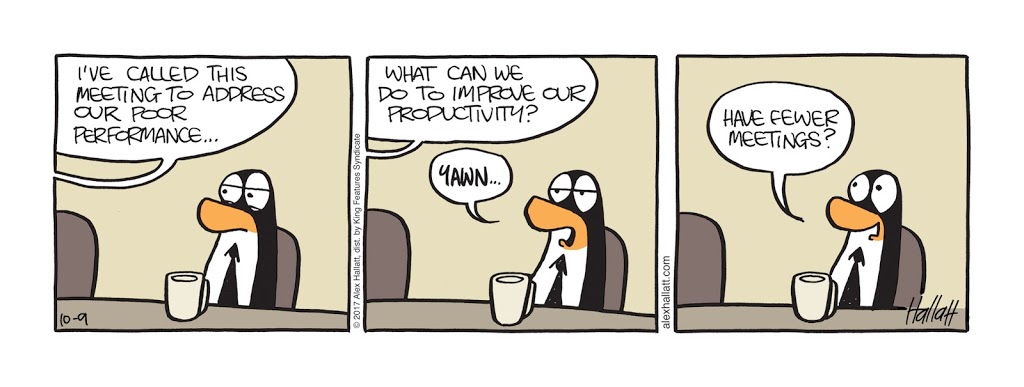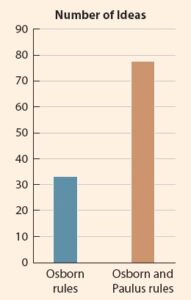Before starting, let me be clear that this article is not about what we do specifically in meeting, or about conflicts and politics that go before, during and after meetings. This article is about thinking before having a meeting if we should have it in the first place, what can we do to make the most of it? And what can you do on the individual level? And it matters, here are some statistics to get you interested:
- 37$ billion are estimated to be wasted due to meetings in the US alone.
- 59% of Employees Less Engaged Due to Number of Meetings
- 9 in 10 people daydream in meetings
- In a survey of 182 senior managers in a range of industries: 65% said meetings keep them from completing their own work. 71% said meetings are unproductive and inefficient. 64% said meetings come at the expense of deep thinking. 62% said meetings miss opportunities to bring the team closer together.

First of all, why do we meet? Interestingly enough, whenever this question is asked people start answering with the outputs of meetings, come up with ideas, solve problems, brief each other…etc. However, I believe we meet because we are humans and we need the interaction. Why do we have video conference sessions for remote teams or for important decisions? Because as humans we need some basic face to face communication.
A debate that is worth considering is what constitutes a meeting? Would a brief interaction between two people to ask about something considered a meeting? Does it have to be more than 2 people? What about interviewing for recruiters? Or a sales meeting with a client? Is it a meeting or a part of their job? If it is a part of their job? What about other meetings? For the purposes of clarifying terminology, we will consider meetings as face to face interactions that last more than a couple of minutes.
To make the most of our meetings, sometimes it is best to try not to have them at all! Many meetings can be substituted with an email for example, or a video. On the other hand, even if it can be substituted, should it be? Lets take a new employee example who is shown a video about what he needs to do with minimal human interaction and then asked to start doing his job, seems a bit distant to me. So the first question should be (Do we have to have this meeting?).
Once we decide to have the meeting, we need to know what we are going to cover in the meeting. A meeting about the strategy to move forward seems a little too vague. A focused meeting with detailed agenda and appropriate time helps make the most out of meeting. So we should ask (Is it focused enough? is the purpose clear enough? Is the time enough?). And with the purpose, is the purpose in line with what we as a company or culture believe. For a quick example, a meeting to enforce a dress code might be against the value of workplace freedom. In SCRUM for example, inspection and adaptations are pillars and a retrospective meeting fulfills that purpose by revisiting how work was done and planning how to improve it.
We are usually afraid of missing out, meaning we usually do not ask the right people to attend the meeting. Sometimes it is people who just need a summery, sometimes the opposite happen and who has to be in the meeting is not told. This can be tricky. Think of people you want to invite and ask (should they attend? Why? or they just need to know the results?) of course if your meeting is not focused, different people might be needed at different stages, if you are struggling with this question, do not be afraid to refocus the meeting.
Great, now we know what the purpose of our meeting is and who to invite, let us start the meeting. Hold on! Have the agenda detailed and down on paper (can be on soft format, but I personally prefer paper) and share it with people beforehand. Allow people time to look at it and get into the right mindset to be focused for the meeting. I would go as far as to give 5 to 10 minutes before the meeting for people to read it and make sure everyone is on the same page.
Here is what is the biggest shocker, how often to do we think of improving our meetings and interactions? Even though we spend on average one day a week in meetings! We take meetings for granted as a part of work and we believe these meetings are the way they are and will never change, which protects bad practices from being challenged. It is not about forcing change to meetings, it is about knowing that they can improve and then allowing them to, one meeting at a time. There is an opportunity after every meeting (What can we improve?).
You might be thinking to yourself “I cannot change the way my organization does meetings, so what is the point?” Here is what you can do today. Ask two simple questions when possible: “What is the meeting about?” And “Why should I attend?”
You got this far and will give you two advises for most common types of meetings, work meetings and brainstorming. For work meetings here are some general advice:
- Define the objective of the meeting. Asking one simple question at the onset of the meeting, “What is the objective of this meeting,” can prove invaluable in terms of ensuring everyone is on the same page and focused on keeping the meeting on point, rather than allowing it to devolve down endless rat holes unrelated to the matter at hand.
- Identify who is driving. Each meeting needs one person behind the wheel. The primary role of this point person is to ensure the conversation remains relevant, that no one person ends up dominating the discussion.
- Take the time to define semantics (and first principles). Words have power, and as such, it’s worth investing time upfront to ensure everyone is on the same page in terms of what certain keywords, phrases, and concepts mean to the various constituencies around the table.
- Assign someone to take notes. multiple people recalling one event in multiple ways — but also creates a plan of record for what was discussed and agreed to. This can also be particularly valuable for invitees who weren’t able to make the meeting.
- Summarize key action items, deliverables, and points of accountability. Don’t end the meeting without summarizing key conclusions, action items, and points of accountability for delivering on next steps.
For brainstorming meetings, a study is summarized below:
Osborn’s Rules for Brainstorming
- Expressiveness Group members should express any idea that comes to mind, no matter how strange, weird, or fanciful. Group members are encouraged not to be constrained nor timid. They should freewheel whenever possible.
- Nonevaluation Do not criticize ideas. Group members should not evaluate any of the ideas in any way during the generation phase; all ideas should be considered valuable.
- Quantity Group members should generate as many ideas as possible. Groups should strive for quantity, as the more ideas, the better. Quantity of ideas increases the probability of finding excellent solutions.
- Building Because all of the ideas belong to the group, members should try to modify and extend the ideas suggested by other members whenever possible.
Paulus’ Three New Rules
- Stay focused on the task. In particular, group members should not tell stories and should not explain their ideas.
- Keep the brainstorming going. There will be lulls in the ideation phase and during these times, group members should continue to brainstorm.
- Return to previous categories. Group members may have new ideas about a given topic or category later in the process, so they should cycle back to those ideas.

